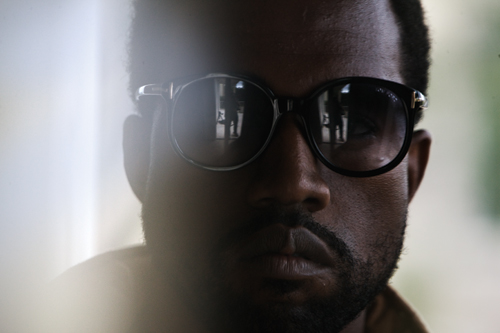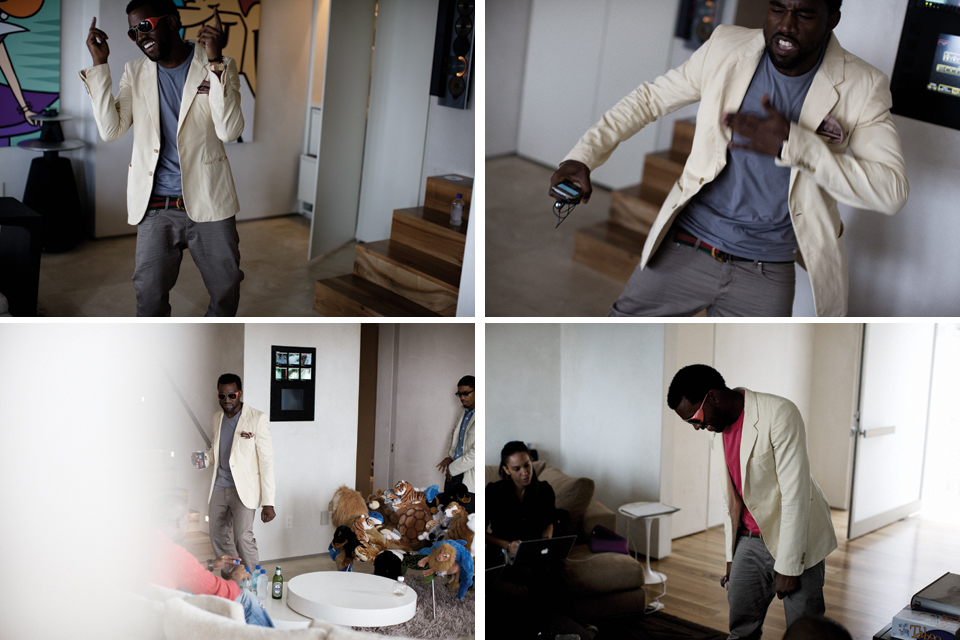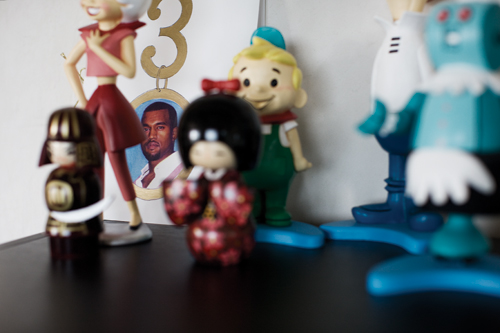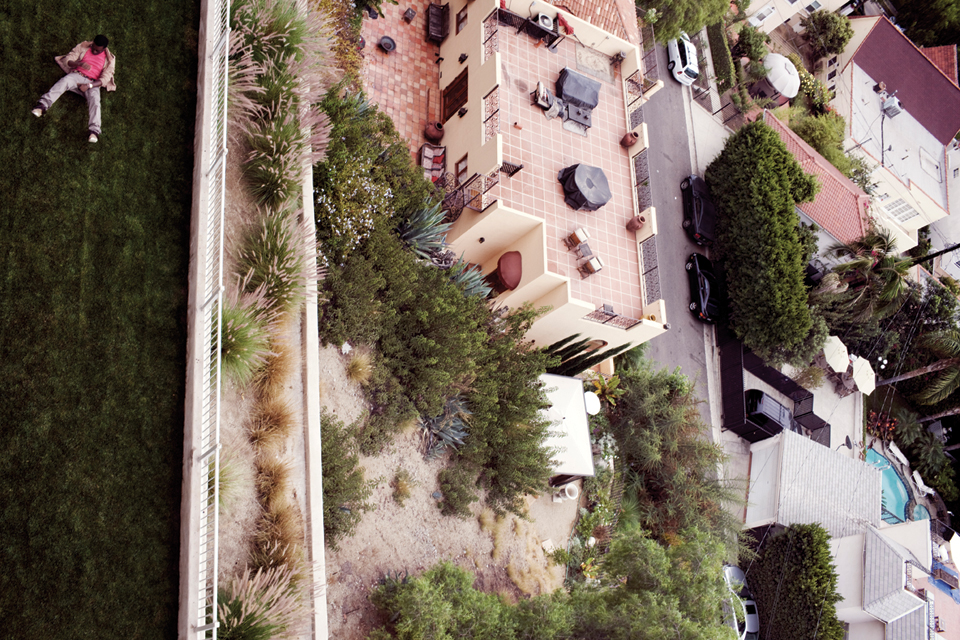Kanye West's 808s & Heartbreak, received cautiously upon its release in 2008, remains one of the most experimental and prescient moments in Kanye's career. Today, we mark the four years that have passed since its initial release with our FADER #58 cover story, where Peter Macia joins Kanye at home for a talk about the album, becoming a pop icon and, of course, Kanye himself.
You'll never take the heart from Kanye West.
“Kanye West wants to make history.” That is how we began our Kanye story in our December 2003 issue, his first cover. Exactly five years later, he has done so in a way that even we didn’t imagine. His personal style—skinny jeans rising out of exclusive colorway sneakers matched with high fashion sunglasses—influences kids from Flatbush to Fukuoka, and now he is finishing work on his own menswear line, Pastelle, and designing a shoe for Nike named the Air Yeezy. At the same time, of course, his music has dominated the pop charts, with seven of his own songs reaching the Top 20 of Billboard's Hot 100—twice reaching number one—while countless productions for other artists pepper the mainstream with his ever-changing sound. Kanye West has become a brand synonymous with not just success, but innovation, and its CEO is as mercurial and provocative as Steve Jobs.
But this year was different for West. As the world knows, he has been through some difficult personal times—and he appears to have emerged a changed man, simultaneously more mature and more childlike in his lack of inhibition. From his absurdly readable blog (he writes it) to his Glow in the Dark one man show and now his new stripped-bare album, 808’s & Heartbreak, Kanye has become the world’s first interactive pop star. He is breaking down the barrier between himself and the rest of us, and as a result, we feel like we’re a part of his life and art.
And we are. The first single from 808’s & Heartbreak, “Love Lockdown,” went up on Kanye’s blog in September and was re-upped a week later with changes conspicuously in line with the criticisms made in the comments of the first post. In the studio and at his house in the Hollywood Hills, as he finished the album, he takes this same social networking approach to creation, as Kanye bounced between associates—Esthero, A-Trak, Hype Williams, Fonzworth Bentley, and Plain Pat, to name a few—absorbing their suggestions before making pivotal decisions on a vocal drop or lyric. The parallels between his process and our new post-internet way of life seem intentional. He is willing to put his inner thoughts, unedited, in public view and sees no point in waiting for old thinkers to tell him what or when to do what he wants. When I met Kanye at his house, an Aston Martin sat in the driveway, an Andy Warhol hung on the wall and I walked into the most enormous closet I’ve ever seen. But Kanye might as well have been some dude I met at a party. He was mellow and eager to talk about whatever subject crossed our minds, which, most of the time was Kanye West.
For this issue, we’re talking to the people who inspire us, who give us something to talk about every issue. You, of course, do that, but also, by pushing the things we love to the masses, you’ve become almost like an ambassador for us. Yeah, I just think about when Jay-Z would be like “I do this for my culture, I do this for the hood.” I’m doing it for that. I’m doing it for where I came from being the only dude in my class that dressed in a certain way, and then finding, Oh there’s other people who think like me too, they just weren’t in my school. And I think that’s what the FADER kids are made of, people who were different or wanted something better than what was the norm. But I had to come to the realization, it wasn’t just the search for something different, but something better, a better solution. I never forget that. I just don’t want people to think that because I’m big I’m not into the same things I was into that made me big. For y’all to put me on the cover, its kinda dope. It feels like I’m on the right path.
In FADER #20, your first cover story, that was in there. Everything that you’re doing now is budding in that story. I was saying it from the gate, I’m into Louis Vuitton, I wanna be pop. I spent my whole check on those two bags I wore for those pictures. Those are some of my best pictures, other than having a really bad haircut. Now, the only thing is pop, I really like popular culture. I’m all about Walt Disney, Coca-Cola, Louis Vuitton, Nike. I want people to remember me the way they know Nike. That level of impact. Who was the last person who really had it like that? When I was a kid, it seems like there was a lot of great pop music. There was George Michael, Michael Jackson.
 Murakami said once, “I don’t mind being hated if I’m popular.” There’s a chance of that happening with this album—that it’s pop, potentially hugely popular, but not with the same people who loved your other albums. Let’s hope it’s pop. They asked me what genre to put it under. I was like, Put it under pop, because I’ll wear that. I love wearing a label that people think is uncool. Because it’s like, is it not good music now? You know, music is special to people, so they hold it really tight to themselves. A lot of times when it becomes popular they feel like its not theirs anymore, they feel like its not just a part of their little group. But I feel like music is for everyone. Like when you were a little kid, did you really think about how many kids sang “Frere Jacques”? I make music that is good, and it should be the biggest.
Murakami said once, “I don’t mind being hated if I’m popular.” There’s a chance of that happening with this album—that it’s pop, potentially hugely popular, but not with the same people who loved your other albums. Let’s hope it’s pop. They asked me what genre to put it under. I was like, Put it under pop, because I’ll wear that. I love wearing a label that people think is uncool. Because it’s like, is it not good music now? You know, music is special to people, so they hold it really tight to themselves. A lot of times when it becomes popular they feel like its not theirs anymore, they feel like its not just a part of their little group. But I feel like music is for everyone. Like when you were a little kid, did you really think about how many kids sang “Frere Jacques”? I make music that is good, and it should be the biggest.
Do you think there are people who like your music despite themselves because it appeals to something more basic in them? There was something about being a little kid…there was no reason why I would like something or wouldn’t like something. You know, my mom never listened to songs that particularly appealed to me. Back then, the only songs they had for kids were made by the Muppets and shit. The songs I was listening to, I liked the melody but the information, it dealt with stuff someone went through, like a real life situation. I think it takes experience to be a great poet and communicator, and as life goes on I have more and more experiences, so hopefully I’ll just get better and better. Because it’s like, how do you wanna communicate? You wanna communicate through rap? Through poetry? Through song? The thing is getting the point across, and I think in music, message and melody are the keys. It’s the reason why people teach you the ABCs with melody behind it. And [808’s & Heartbreak] is the ABCs of life and relationships.
Does this album feel like your purest vision then? I always felt like that, every time. When I did The College Dropout, it was really a new idea that caught people off guard. This album is a complete new idea… some whole different shit that’s gonna change music again. I think it’s our responsibility to be fearless, to have the masses’ and radio’s ear and still push the envelope. That’s why I was always supposed to be the independent champion. And that’s why it was such a big, terrible thing when I ran on stage on Justice [at the MTV Europe Music Awards]. It was like, Aw, he’s one of them now. He’s no longer the kid who went to art school and stuff. It’s like, now he’s just…
He’s too big. Yeah. And that was a great awakening to me, to not be so caught up in your own hype. There’s a reason why the universe plans for certain things to happen the way they are, and the only thing that you can be responsible for is your art. I used to feel this sense of entitlement that’s completely immature. I needed to really get past that. It’s been a great detriment to people liking me, me being a spoiled baby, and people still make jokes about it but they don’t realize I’m not that same person.
Getting back to the idea of purity, you finished this album in three weeks. Are you creating without thinking about it as much now? Well yeah, but when you say don’t think about it—people say, “He’s a pop singer now,” and I’m like, Yes, correct! They’re like, “It sounds like he wrote this in five minutes,” and I’m like, You’re right, it took me five minutes! Is something better if it took five years than if it took five minutes? I feel like all the words are in you, you’re just blocking yourself, you’re blocking your creativity. Society has put up so many boundaries, so many limitations on what’s right and wrong that it’s almost impossible to get a pure thought out. It’s like a little kid, a little boy, looking at colors, and no one told him what colors are good, before somebody tells you you shouldn’t like pink because that’s for girls, or you’d instantly become a gay two-year-old. Why would anyone pick blue over pink? Pink is obviously a better color. Everyone’s born confident, and everything’s taken away from you. So many people try to put their personality on someone else. Especially me, they try to suggest what I should do. What I want people to realize at this point is, I don’t give a fuck. That’s why I made this album. I’m using auto-tune because I don’t give a fuck. I like the way it sounds. This is the way I’ma put my shit up, this what I like the most. You can’t deny me, you cannot deny Wayne, you cannot deny Pain. T-Pain taught me a lot: he just brought a whole vibe and energy when he came down to Hawaii, he was constantly expressing himself.

Did you have an epiphany about singing on the new album? I never even thought about it like that, I just thought about what I wanted to hear when I was making music, just like hook after hook after hook after hook after hook. It’s the musical version of an Obama speech.
Do you feel like you’re getting to a point with music where you’ve done all you could? Like you could move on and focus on your fashion line or something else entirely? I can’t foresee myself not wanting to make music. What was so great about this album was like, at any given time, I could just Superman in the booth and pull out arguably the best rapper in the world. Is this the final frontier of music? I would think its not quite conquered yet, there’s still a ways to go. There are levels, like, did you see the Michael Jackson in Budapest concert? When I look up two, three years from now, and I’m doing my own concert for five hundred thousand people, it’s like, maybe this was a beginning point. It”s gonna be people that, as big as a celebrity as I am, that really just discover me on this album. I learned so much from going to those fashion shows. I thought I was making some fashionable shit on the last album, and they weren’t playing my shit. I want my music to be played the same place you could play a Feist song, but I want it to still work in a strip club, still work in a car. One thing about traveling a lot, it gives me a lot more worries about places I’m not being played. I go to Starbucks everyday, listen, look at the CD rack, and I’m like, I’m not here. I could easily give up and be like, Well, I’m black, and I’m a rapper, or I could be like, Man, what could I do to get here? I mean you only got one life and shit. Who’s to say what you can and can’t do? And like “Love Lockdown” is just a great accomplishment in the idea of, like, Thom Yorke in the strip club.
The Kanye glasses were everywhere though, from Canal St. to malls in Oklahoma. Were you surprised at how ubiquitous those became? Because straight up, those are weird ass glasses. I think there hasn’t been a Michael Jackson since Michael Jackson, but when stuff like that happens, it’s little pieces of what he had, his level of influence. And it’s like that’s either the one-off or it’s the beginning of a lot of it.
Do you think that’s your white glove moment? Yeah I do think it was very much like that, but you know, Michael Jackson is the god of all pop music of all time. And it’s blasphemous to compare yourself to god, but that was very Michael Jackson-esque.
 You might have another cultural moment with “Robocop.” Do you understand that if this comes out as a single, every dude is gonna be calling his girlfriend a Robocop when she gets mad. People are gonna to start saying that constantly. Yeah, I’m the only voice for the guys because rap dudes don’t rap about love, and R&B dudes rap about love, like, “I want to love you.” So Pink is making songs, Ciara, all these male-bashing songs, so I’m like the only dude to speak up for the guys from an intelligent, really been in a relationship type perspective.
You might have another cultural moment with “Robocop.” Do you understand that if this comes out as a single, every dude is gonna be calling his girlfriend a Robocop when she gets mad. People are gonna to start saying that constantly. Yeah, I’m the only voice for the guys because rap dudes don’t rap about love, and R&B dudes rap about love, like, “I want to love you.” So Pink is making songs, Ciara, all these male-bashing songs, so I’m like the only dude to speak up for the guys from an intelligent, really been in a relationship type perspective.
We talked a little bit before about having rivals, people who are your creative opposite. I appreciate when bad things happen, obviously, when you listen to this album it’s very personal. And I just think that if I hadn’t been through the terrible things that I’ve been through, that I was the victim or the cause of, that I couldn’t deliver art on this level, and that’s the good out of it.
What do you think about “Swagger Like Us,” along with MIA’s “Paper Planes,” and “Love Lockdown” all hitting people together? Such a great time. It’s like, why does that happen? I’m like a vessel, and God has chosen me to be the voice and the connector. I can’t be responsible. I’m good, but I’m not that good. So my job is just to be in the studio and do videos, and like, I just stand here and let God do the rest. I was super scared and shit, like the MTV joint, but afterwards it was the best response I got on any performance. People were like, “It’s so good, you did so good,” and I was like, “Word?” Just being nervous, that’s the childlike shit again. Why put yourself in the situation to be nervous again? You gotta just be confident the rest of your life? I mean, be confident, but I think its just a level of adventure and craziness and delusion, delusions of grandeur, like Hey, maybe I can fucking sing! Maybe I can’t, it doesn’t fucking matter, but it’s exciting.
Be an astronaut. Yeah, it’s fucking exciting. I’m really excited about this album. Yo so, Vanessa [Beecroft], you don’t have to put this in the interview, but she said, right when she got the request to [design the album art], and we told her the name of the album’s 808’s & Heartbreak, she said her husband had just broken up with her and they had been married for eight years. And when I was sitting in the studio in Hawaii and I asked somebody for the number to the hotel and they were like “808-duh duh duh” because Hawaii’s area code is 808. And we just randomly do the whole album in Hawaii, and I’m not trying to be all weirdo, connect the constellations like that, but this shit is like, too meant to be. Therefore, let’s put it out, okay. It’s kinda good!


